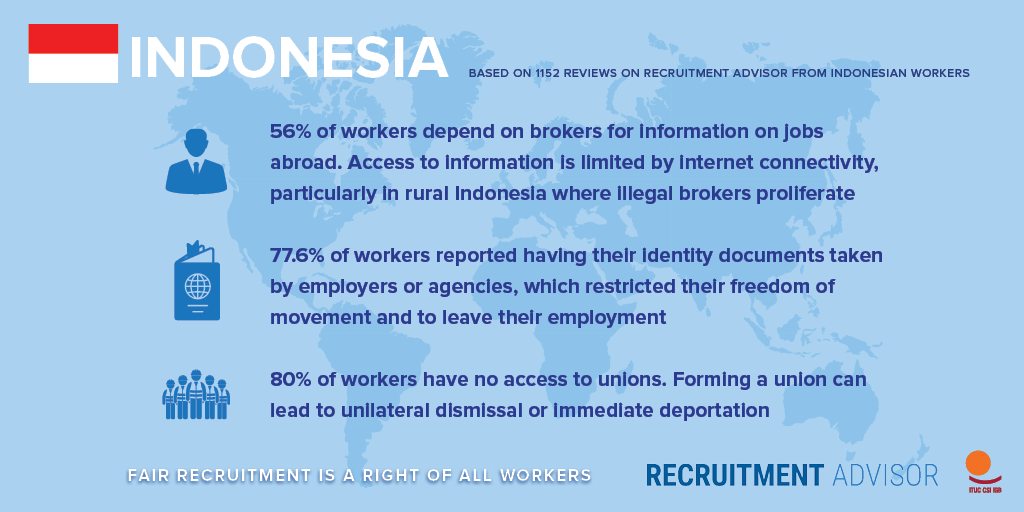Realizing fair and ethical recruitment:
Insights from Indonesia
Yoga Prasetyo
August 2022
As COVID-19 starts abating, overseas placement of Indonesian workers is slowly returning to normalcy. Evidence shows that Indonesia’s labor out-migration has been increasingly feminized, and many of Indonesian migrants are deployed to informal sectors, which remain largely unregulated and unprotected. Some steps have been taken by the Indonesian government to protect its migrant workers–the most commendable of which, perhaps, is the adoption of Law No. 18/2017 on the Protection of Indonesian Migrant Workers. One can argue that Indonesia’s current legal framework on the protection of its migrants is robust. In fact, Law No. 18/2017 reflects some of the core principles of ethical recruitment. However, some challenges hinder the full implementation of the law, including a lack of political will and legal inconsistencies. It is such limited political will and confusion in legal frameworks that have contributed to failures in realizing fair recruitment, which manifest in a wide range of rights violations as explained below:
- Access to information: access to information on overseas employment is constrained by disparity in internet connectivity, leaving blind spots in much of rural Indonesia where illegal brokers come to play a key role. In fact, evidence in this study shows that the majority of respondents (56.1%) depend on brokers for information on jobs abroad.
- Recruitment fees: Indonesian migrant workers continue to pay exorbitant fees and costs for overseas placement despite an existing legal framework/commitment to zero-cost recruitment. Ironically, the Indonesian government ‘outsources’ its obligation to banks by introducing the so-called People’s Credit Program, which allows migrants to take low-interest loans to finance their recruitment. This move creates confusion which, in turn, leads to some migrants failing to depart for destination countries.
- Pre-departure training and orientation: Respondents shared that training nurtured in them a false sense of inferiority, and some claimed that their training was either inadequate or irrelevant to their jobs abroad. This study also found that the overwhelming majority of respondents (97%) received information on rights and obligations during pre-departure orientation. The same respondents, however, also reported a variety of rights violations. It suggests that a bigger system of control is in place, which renders powerlessness among the migrants despite their knowledge of employment rights.
- Employment contract: As evidenced in this study, the majority of respondents reported signing a contract prior to migrating, but 15.3% of respondents shared that they had difficulties understanding the contractual information. Additionally, details of contractual information differ greatly from one migrant to another, suggesting the need for a standard employment contract. In response to it, Indonesia has attempted to create a standard contract, but it fails to incorporate many of the applicable international labor standards.
- Freedom to liberty of movement and to leave employment: 77.6% of total respondents reported having their identity documents taken by either employers or agencies or both. Indeed, confiscation of documents is a popular way of exerting absolute control on migrants’ lives. This study also found that migrants are actively discouraged to change employers and provided with very limited chances of flexible resignation.
- Right to union: 79.9% of respondents reported no access to unions. In fact, the right to union/association is nonexistent in many destination countries. Joining or forming a union can lead to unilateral dismissal or immediate deportation.
- Non-inclusive recruitment: Despite Indonesia’s highly feminized labor migration, recruitment processes are far from being gender responsive and inclusive. In fact, Law No. 18/2017 actively perpetuates gender inequality by requiring migrants to seek their spouses’ consent in order to be cleared for migrating. The same law also discriminates against persons with disabilities as it stipulates the requirement of ‘physical and mental fitness’, which is often translated to having no disabilities.
- Rating of agencies: a large number of respondents expressed unwillingness to return to the same agencies and employers, suggesting that recruitment practices at home shape the outcomes of migratory experiences abroad. Despite that, half of the respondents would not mind returning to the same destination countries. Based on the ratings given by reviewers, only 11.5% of employment agencies are seen by respondents as law-abiding.
- Additional findings: other problems that are foregrounded include unilateral termination of contracts, constrained access to communication during recruitment/training, and unpaid labor that is disguised under the banner of training.
Way forward
- Government to promote gender responsiveness in recruitment processes by referring to UN Women’s Self-Assessment Tools for Recruitment Agencies.1 Government should also refer to Law No. 8/2016 on Persons with Disabilities (PWDs) to ensure that recruitment is accessible/inclusive to PWDs;
- Government to clear up legal inconsistencies and implement its commitment to zero-cost placement by ensuring that all recruitment and recruitment-related costs are jointly borne by prospective employers and the government;
- Government to abolish wage theft by promoting bank transfer as a method of payment so that migrants’ salary payments can be verified;
- Government to establish a Memorandum of Understanding with governments of destination countries to ensure their protection throughout all migration cycles;
- Government to coordinate differing recruitment schemes and work together on data sharing, bearing in mind data privacy and protection;
- Abolish policies that discriminate against migrants on the basis of gender, such as prohibition of pregnancy and ‘immoral conduct’.
Read full report here.
Konfederasi Serikat Buruh Sejahtera Indonesia (KSBSI)
The Confederation of Indonesia Prosperity Trade Union (KSBSI) is a national trade union centre in Indonesia. It was founded in 1992 and claims a membership of 2.1 million.

